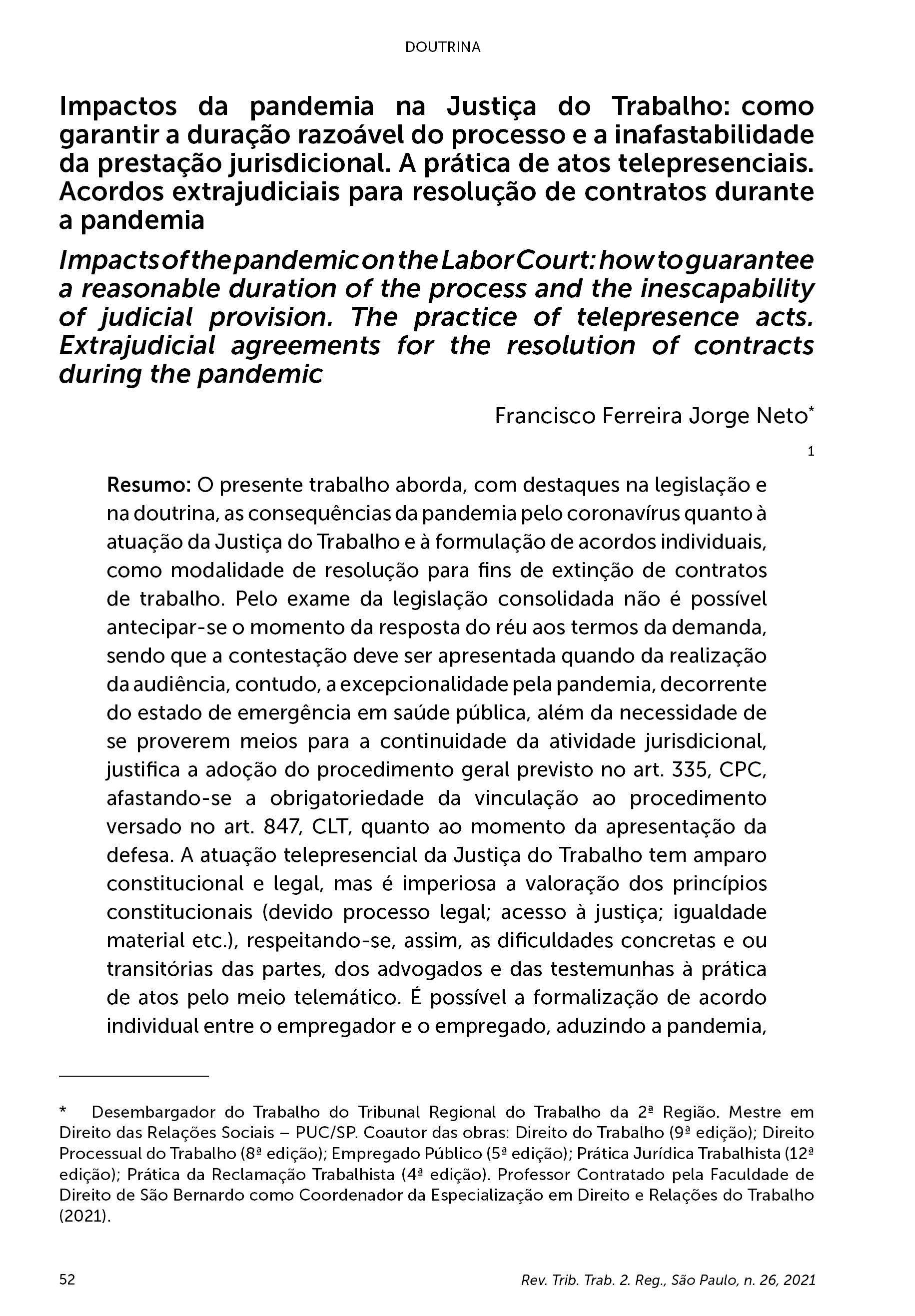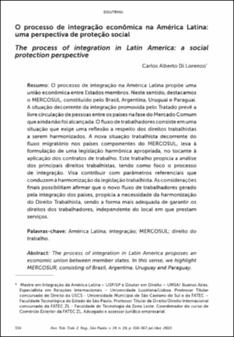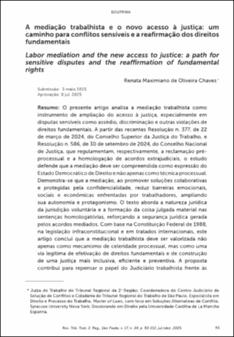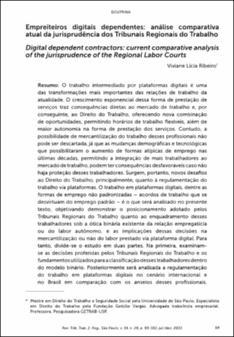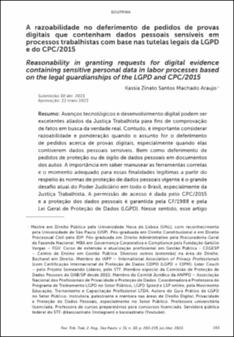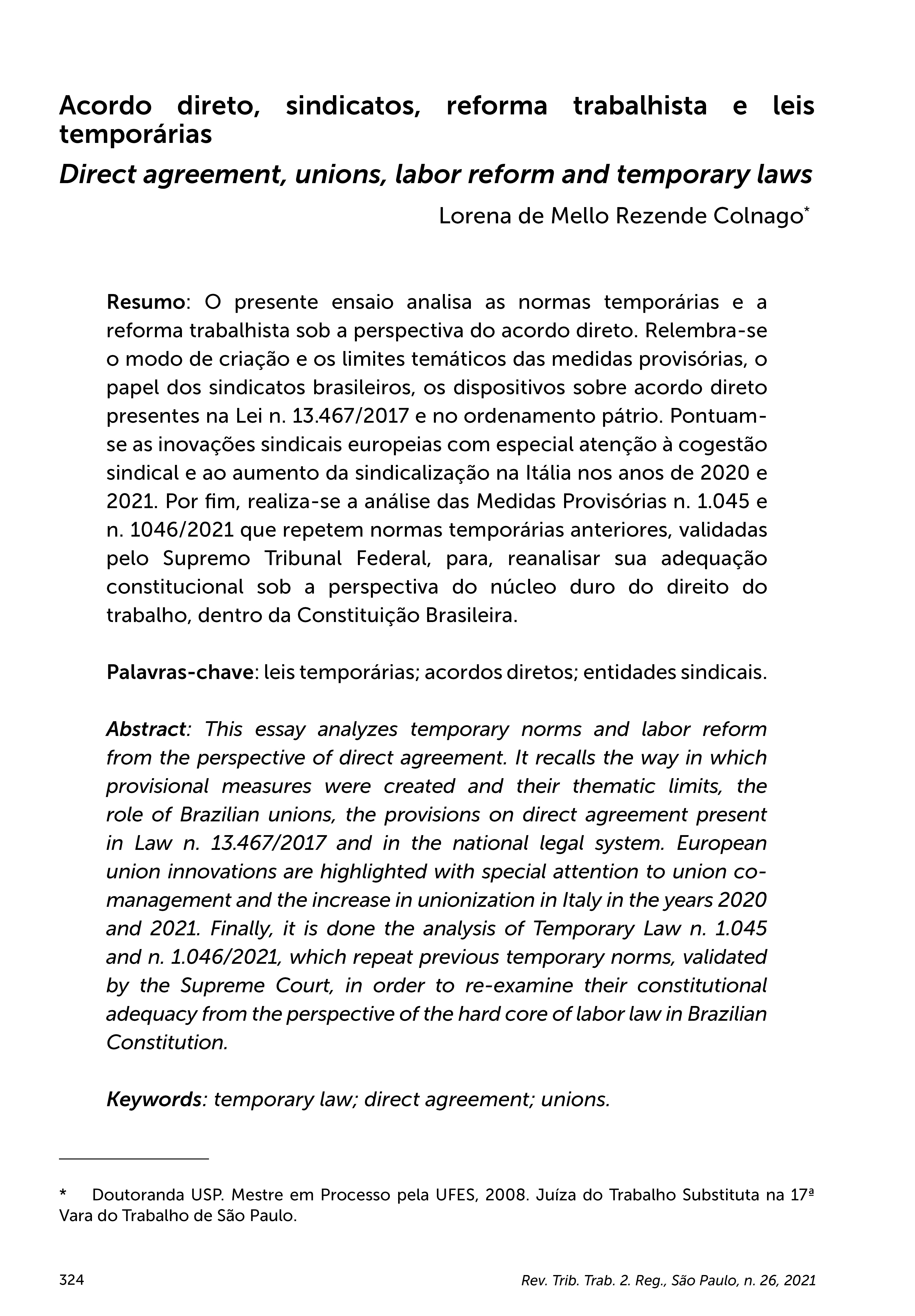Artigo de periódico
Impactos da pandemia na Justiça do Trabalho: como garantir a duração razoável do processo e a inafastabilidade da prestação jurisdicional. A prática de atos telepresenciais. Acordos extrajudiciais para resolução de contratos durante a pandemia
| dc.contributor | Jorge Neto, Francisco Ferreira | |
| dc.date.accessioned | 2021-10-06T17:29:28Z | |
| dc.date.available | 2021-10-06T17:29:28Z | |
| dc.date.issued | 2021-10-27 | |
| dc.identifier.citation | NETO, Francisco Ferreira Jorge. Impactos da pandemia na Justiça do Trabalho: como garantir a duração razoável do processo e a inafastabilidade da prestação jurisdicional. A prática de atos telepresenciais. Acordos extrajudiciais para resolução de contratos durante a pandemia = Impacts of the pandemic on the Labor Court: how to guarantee a reasonable duration of the process and the inescapability of judicial provision. The practice of telepresence acts. Extrajudicial agreements for the resolution of contracts during the pandemic. Revista do Tribunal do Trabalho da 2. Região, São Paulo, n. 26, p. 52-74, 2021. | pt_BR |
| dc.identifier.uri | https://basis.trt2.jus.br/handle/123456789/14410 | |
| dc.description.abstract | [por] O presente trabalho aborda, com destaques na legislação e na doutrina, as consequências da pandemia pelo coronavírus quanto à atuação da Justiça do Trabalho e à formulação de acordos individuais, como modalidade de resolução para fins de extinção de contratos de trabalho. Pelo exame da legislação consolidada não é possível antecipar-se o momento da resposta do réu aos termos da demanda, sendo que a contestação deve ser apresentada quando da realização da audiência, contudo, a excepcionalidade pela pandemia, decorrente do estado de emergência em saúde pública, além da necessidade de se proverem meios para a continuidade da atividade jurisdicional, justifica a adoção do procedimento geral previsto no art. 335, CPC, afastando-se a obrigatoriedade da vinculação ao procedimento versado no art. 847, CLT, quanto ao momento da apresentação da defesa. A atuação telepresencial da Justiça do Trabalho tem amparo constitucional e legal, mas é imperiosa a valoração dos princípios constitucionais (devido processo legal; acesso à justiça; igualdade material etc.), respeitando-se, assim, as dificuldades concretas e ou transitórias das partes, dos advogados e das testemunhas à prática de atos pelo meio telemático. É possível a formalização de acordo individual entre o empregador e o empregado, aduzindo a pandemia, como critério para a transação dos direitos trabalhistas, contudo, face aos princípios basilares do Direito do Trabalho (protetor e o da irrenunciabilidade dos direitos trabalhistas), há de ser assegurado ao empregado o direito de ação para a discussão de eventuais fraudes à aplicação das normas trabalhistas, além do respeito ao pagamento mínimo como previsto no art. 502, CLT. Como forma de segurança jurídica às partes, tem-se a formulação de um pedido de homologação de acordo extrajudicial (arts. 855-B a 855-E, CLT). Quando desta avaliação, o Magistrado irá analisar se há ou não a pandemia, como critério equânime, para a resolução do contrato individual de trabalho, com plena quitação dos direitos trabalhistas. Pondere-se que a homologação de acordo constitui uma faculdade do juiz, inexistindo direito líquido e certo tutelável pela via do mandado de segurança (Súm. 418, TST). | pt_BR |
| dc.description.abstract | [eng] The present work addresses, with emphasis on legislation and doctrine, the consequences of the pandemic by the coranavirus on the role of the Labor Court and the formulation of individual agreements, as a form of resolution for the purpose of terminating employment contracts. By examining the consolidated legislation, it is not possible to anticipate the time of the defendant’s response to the terms of the demand, and the defense must be presented at the time of the hearing, however, the exceptionality of the pandemic, resulting from the state of health emergency public, in addition to the need to provide means for the continuity of jurisdictional activity, justifies the adoption of the general procedure provided for in art. 335, CPC, moving away from the obligation to bind the procedure set out in art. 847, CLT, regarding the moment of presentation of the defense. The telepresence action of the Labor Court has constitutional and legal support, but it is imperative to value the constitutional principles (due legal process; access to justice; material equality, etc.), thus respecting the concrete and/or transitory difficulties of the parties, from lawyers and witnesses to the practice of acts by telematic means. It is possible to formalize an individual agreement between the employer and the employee, adducing the pandemic, as a criterion for the transaction of labor rights, however, in view of the basic principles of Labor Law 54 DOUTRINA (protection and the non-waivability of labor rights), there is a to ensure the employee the right to action to discuss possible frauds in the application of labor standards, in addition to respecting the minimum payment as provided for in art. 502, CLT. As a form of legal certainty for the parties, there is the formulation of a request for approval of an extrajudicial agreement (arts. 855-B to 855-E, CLT). During this evaluation, the Magistrate will analyze whether or not there is a pandemic, as an equitable criterion, for the resolution of the individual employment contract, with full discharge of labor rights. It is considered that the ratification of an agreement constitutes a power of the judge, with no liquid and certain right enforceable through the writ of mandamus (Summary 418, TST). | pt_BR |
| dc.language.iso | pt_BR | pt_BR |
| dc.relation.ispartof | Revista do Tribunal do Trabalho da 2. Região: N. 26 (2021) | pt_BR |
| dc.subject | Audiência de conciliação | pt_BR |
| dc.subject | Contrato de trabalho | pt_BR |
| dc.subject | Covid-19 | pt_BR |
| dc.subject | Mediação e conciliação | pt_BR |
| dc.subject | Princípio constitucional | pt_BR |
| dc.subject | Saúde pública | pt_BR |
| dc.subject | Segurança jurídica | pt_BR |
| dc.title | Impactos da pandemia na Justiça do Trabalho: como garantir a duração razoável do processo e a inafastabilidade da prestação jurisdicional. A prática de atos telepresenciais. Acordos extrajudiciais para resolução de contratos durante a pandemia | pt_BR |
| dc.title.alternative | Impacts of the pandemic on the Labor Court: how to guarantee a reasonable duration of the process and the inescapability of judicial provision. The practice of telepresence acts. Extrajudicial agreements for the resolution of contracts during the pandemic | pt_BR |
| dc.type.genre | Artigo de periódico | pt_BR |
| dc.type.material | Documento textual | pt_BR |
| dc.relation.ispartoflink | https://basis.trt2.jus.br/handle/123456789/14389 | pt_BR |
Coleção
-
Artigos de Periódicos132
Artigos de Periódicos



